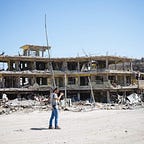It is not possible to imagine that the Assad regime’s forces targeted the Turkish soldiers without a Russian operation order, and it is not true that the Iranians implicated Assad in this game. The Iranians do not want a new enmity in the region after the assassination of Soleimani and the siege imposed by the Americans, in addition to that they no longer trust the Russians nor Bashar al-Assad, indicating that they published insulting news of the Damascus regime such as that Soleimani was managing the battles from the Assad room when Damascus was just around the corner from the fall of the opposition forces, and leaks of the instructions of Supreme Leader Khamenei personally to provide medical care for Assad with brain tumor.
The Russians are talking about the Turks ’lack of commitment to what was stated in the Sochi Agreement in terms of dismantling the militant armed forces, which are described as terrorism, and opening the two pivotal roads M4-M5, but the matter is deeper and more complex than the Idlib region, because the Russians were also an obstacle to the Turks in other places along the borders, They pave the way for negotiations between the Assad regime and Kurdish groups in which Ankara sees a threat to its national security.
Given what the Russians want, the opening of the international route and the use of full power to establish control over the various regions is a necessity given that more time means more trouble and costs, and the Russians focus their diplomatic message on reconstruction, which the Europeans and Washington oppose.
Russian President Putin has worked silently during the last period to ratify constitutional amendments that guarantee its continuation after 2024, where many powers will be transferred to the State Council, which is being paved for Putin to be at the head after the end of his term, a political process that may require speeding up the stabilization of strategic interests at the international level, especially in Syria and the region.
On the other hand, the United States seeks to brake the Russian ambition, and it is actually possible that Syria is a region of shock and obstruction, and the situation in Washington appears better than before, as the picture appears to be more clear to them about the next stage.
In their battle in Syria, the Turks have a number of cards, including:
First: The American desire to stop the Russian expansion and remove Iran, so that cooperation with Ankara remains a necessary option at this stage.
Second, European concern about new waves of refugees could be threatened by the Turks.
Third: The Adana Agreement of 1998, which is no less important and legitimate than the pretext of the Russian and Iranian presence at the request of a government recognized legally in the United Nations.
Fourth: The Turks qualify for tens of thousands of fighters from the Syrian opposition elements present on the ground.
The most important question remains, does Washington end Putin’s dream in Syria through the Turks, and does Moscow worry about this possibility, and this question leads to an answer to what happened in the western countryside of Idlib and the eastern to Aleppo and targeting two Turkish observation points and killing about 13 soldiers there.
The Russians realize that the Trump administration is working to restore the Turks to their side and invest in this relationship, which justifies the escalation by pushing Assad’s forces along with an Iranian-backed militia to crawl and occupy dozens of villages in the area agreed to be subject to the de-escalation agreement.
Turkish soldiers were killed under a Russian air cover, and the response came by shooting down a helicopter with a thermal missile that might be supplied by Turkey to the opposition forces, and Turkey cannot do this without coordination with the Americans, and this is quite reminiscent of the American “Stinger” missiles in Afghanistan, which exhausted the Soviets and removed them from the battle, Which “scratches” the Russians ’memory and reminds them of what they do not wish to remember.
The most noteworthy thing in the statements of James Jeffrey, the American envoy on Syrian affairs during the past two weeks, is his suggestions that the Headquarters for the Liberation of Al-Sham “did not constitute a threat at the international level” some time ago, and this is a sign of two possibilities. Dismantling and re-integrating them with the aim of stopping their use as an excuse for the Russians and the Assad regime to fight terrorism, and both possibilities mean that Washington is planning a long battle with the Russians in Syria, and this may increase Moscow’s fears that it will face a war of attrition in a place it should emerge victoriously from.
James Jeffrey arrived in Ankara yesterday evening, and his first statements were in the Turkish language, carrying emotional meanings more than political, comforting the Turkish soldiers, and expressing his country’s standing with their Turkish ally in NATO, and the Turks may not have much confidence in such statements based on experiences Precedent, but a dangerous and highly sensitive test. The American who picked the head of the thread remains a reasonable choice if the other options are a clash with the Russians individually, or humiliating silence and a declaration of defeat in the country where their vulnerability threatens their strategic security
write to Majd helobi
majdhelobi@gmail.com
